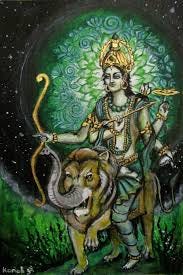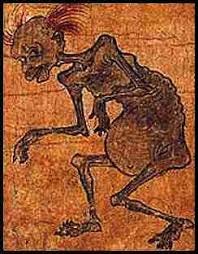I don't know what they want from me
It's like the more money we come across
The more problems we see
-Biggie Smalls
In the past year I’ve found myself following financial markets. A little off-brand, I realize, for someone who focuses on medicine, divination and the promptings of the soul, but we all contain multitudes.
The astrologically-inclined can chalk the newfound interest in money up to Mercury, whose mahādaśa (planetary period) I’m running. Mercury’s the natural trader among the planets, and what’s more, he happens to rule the 11th house in my horoscope. We’ll see what means in a bit. For now the upshot is that where talk of capital and its flow used to bore me to tears, I now find it all kind of fascinating—sometimes horrifying—but rarely boring.
How could it be boring, when the markets resemble a packed watering hole thronged with creatures pushing and shoving their way to the edge for a drink. It’s a dog-eat-dog scene out there. While some prosper, growing sleek and water-fat, the ground around them is littered with gnawed bones. Poor suckers around the edges are flailing, caught in traps crude or subtle. Some bite off their own limbs to escape.
Of course, the carnage is rarely so naked as that. You don’t hear about limbs ripped off, creatures swallowed whole; you hear about mergers and acquisitions. All the action is visible in two dimensions, for those with eyes to see, on charts and order books. The trained gaze watches moving averages, stochastic oscillators and Fibonacci levels with the focus of a hawk on its prey.
For Mercury, its all a great game, understand; for the fleet-footed god, commerce is an end in itself. Nothing could suit him better than the thrill of exchange, the chance to match wits with the market.

A game it may well be. But I’ll note that the game is sticky. Like peanut butter cookie dough or pine resin, it’s hard to get off one’s hands.
If you lose, you want back in.
If you win, you want to win bigger next time.
And who’s to stop you? There’s no target or goal besides the one you yourself impose. And that target can easily shift. It’s all just numbers on a screen, and numbers can always go higher.
You start to see how people get embroiled in this stuff. How they never leave the watering hole. More insidiously: how they can become winners, and yet losers at a bigger game.
~ ~ ~
The crypto-sphere is where some of the easiest money in human history has been made over the past 15 years. We’re talking about people who bought $50 worth of bitcoin at the right moment and now find themselves sitting on $100 million.
Many of these crypto millionaires seem strangely childish, as if their wealth cushioned them from ever having to grow up. (Mercury’s something of a Peter Pan himself). The whole online trading scene, with its YouTube channels and Discord groups, is built on tech savviness and the ability to follow trends—and, let’s be honest, a good deal of luck. It’s something of a granfalloon, a pseudo-brotherhood based in little more than shared financial stake.
In this world you’ll find all manner of schemes and scams, rags to riches and rags-to-riches-to-rags stories. What you won’t find there, in my experience, is much wisdom or character. Few of the players have much gravitas to speak of. Too many, having hit it big, lack any sense of purpose beyond hitting it bigger still. You wonder if, with their conspicuously pale faces and blank eyes, some seem to exist entirely in luxurious imprisonment within the confines of the crypto casino.
Because that 11th house of the horoscope I mentioned? It’s surely the house of gains, of upward mobility and the accoutrements of luxury. By any regular measure, it appears to be a nice place. But India’s ancient astrological scriptures had a different view. They looked on the 11th house with some suspicion, and if you spend any time around financial markets, you start to see why.
There’s a specter lurking behind every trade.
Not to put too fine a point on it, but his name is Greed, and he’s a sworn enemy of the soul.
~ ~ ~
Consider.
The soul’s nature is to give of itself. Greed’s nature is to take.
The soul gravitates toward beauty. Nothing scares beauty away faster than greed.
The soul wants to shine like a star. Greed can’t help but suck like a black hole.
You don’t hear much about greed on the news, nor around the dinner table. Is greed a sickness so pervasive that he’s become taboo to discuss? So commonplace we take him for granted? Like the smog in Beijing, almost invisible after a while? Or perhaps it’s that we fear hypocrisy, knowing that we, too, are prone to greed’s depredations. Perhaps we simply don’t know how to identify greed, where to draw the line between him and a healthy self-regard.
One litmus test for the presence of Greed, that old foe: the word “enough” is anathema to him.
Greed denies the very existence of enough.
Bah! What “enough?” How can there ever be enough, when there is more to be had? And when more begets the desire for more still?
“Enough” is the needle that would deflate Greed’s balloon. If Greed has his way, Enough is cancelled. Disappeared. No one will ever even hear his name.
If the enemy of your enemy is your friend, then Enough is a friend to the Soul. It’s good to know Enough.
~ ~ ~
We hear a lot these days about consumption and consumers, key parts of capitalism’s lexicon. Still, I’m always a little taken aback when people refer to themselves as consumers. That’s how bottom-line minded corporations think of people: digits adding up to dollar sign$$$. But to self-identify this way, isn’t that a little…tone-deaf? A little perverse, even?
“Consume” comes from Latin verb sumere, to take or take up. The Latin verb extended to eating, drinking, buying, acquiring or obtaining. (The prefix “con” simply strengthens the sense: to take up altogether or completely). There’s nothing surprising about this derivation: consumers are precisely those who take, who eat, who purchase. What’s troubling is when people start to define themselves this way.
Taking in and eating are not inherently a problem. But for every taker, there’s necessarily a giver. For every eater, one being eaten. It’s dangerous to leave out the donation side of the equation.
Being so oriented toward taking, we’ve lost sight of the necessity of giving and gifting.
Even our excrement, one of the few things we can’t help but give, is withheld from those who could make use of it (the earthworms, the bacterial flora of the soil or a composting system). In the process of excreting, we take even more, by soiling clean water at the rate of 2.5 gallons per flush. Surely this is the definition of bass ackwards.
~ ~ ~
For Native peoples of the American Northwest, wealth has been measured by one’s ability to give. The ritual of the potlatch entailed—still entails today—a radical gifting of one’s possessions. It’s the giving away that makes one wealthy: the wealth consists in the giving.
In modern society we’ve got it exactly reversed. The rich tend to get rich in part through stinginess, hoarding of resources.
But without gift, there is no true wealth. Only stagnant water. Only sickness.
Fittingly enough, the word “consumption” also refers to a disease. It’s an old-fashioned term for what we know as tuberculosis. This is a wasting illness in which the body is feverishly consumed like the wax of a guttering candle.
Hollowed-out-yet-hungry is the state of the tubercular patient. This phrase could also describe the archetypal hungry ghost, with his big empty belly and narrow neck. The more Greed gets his way, the more he grows. Hunger begets hungering. For all that his belly grows, that hungry ghost, Greed, can never satisfy his desires. Outpacing him, they ultimately consume him, doom him.
Hollowed-out-yet-hungry also describes the average American, far gone into Metabolic Syndrome, which is to say obese and yet starving at a cellular level. Reaching for the same fattening-but-empty foods all over again, as the calorie count rises and the cycle perpetuates.
Diabetes is the new consumption.
To be too much the consumer is to be consumed.
The remedy is surprisingly simple. Produce more. Not in the GDP sense, as a wage laborer. But in the old-fashioned sense, starting in the backyard. Grow some food of the kind you’ll rinse before eating.
~ ~ ~
When I catch myself slipping toward greed, or caught entirely in his clutches, time in the garden, barefoot and bare-handed, is a good antidote. Another of the best and surest antidotes is mbira music. As I’ve written about, mbira, “the voice of the ancestors,” is a potent conduit to the spirit realm. It’s all beauty, all soul, no gain involved. Greed flees at the sound.
Even the greatest of Mbira musicians from Zimbabwe may not have much, materially-speaking. But what they have, they give freely. And their cup is refilled, for there is no end to the music. In that sense, they are fabulously wealthy.
~ ~ ~
I don’t mean to set up a dichotomy between rich scrooges on one end and poor prophets on the other. That’s a tired trope, and the world is more complex. Some materially wealthy people are wealthy in spirit as well. And sadly, a proportion of poor people have little spiritual wealth, either.
Money isn’t itself evil. It’s a carrier for our desires, an amplifier of our intent. It helps make what’s inside of us manifest, for better or worse. I heartily recommend Lynne Twist’s The Soul of Money for a deeply felt exploration of the ways money can intersect with or interfere with the life of the soul. One of Twist’s observations is that money is like water. It can be life-giving when it flows appropriately. It can also grow stagnant, or become ruinous.
Inspired in part by Twist, I’d like to end with an observation about the way money and blessings flow.
Like water, money may flow most readily from top to bottom. Blessings tend to move in just the opposite way, from low to high. It’s the most destitute among us who (along with priests, themselves often or traditionally poor) have the power to bless, or to withhold blessing.
“God bless you,” says the man on the corner after receiving a dollar bill from a passer-by. The passer-by may not give it a second thought, but he’s just received a benediction. If he walks by, ignoring the needy person within his power to help, no blessing is forthcoming.
Thus to be in the habit of giving—especially to those most in need—is to remain in blessing.
The blessings aren’t bought, though. That didn’t work for the Catholic church, doesn’t work now and will never work. Rather, they’re gifted, the way rain gives itself to dry soil, and the way the soil gives of itself in turn, sending up wafts of petrichor (that ozone smell of rain on dust) and a new flush of living green.
On a practical level and a ritual one, giving also serves to fend off envy’s evil eye. Simply put, traditional cultures understand that envy and resentment are powerfully disruptive forces, and have developed ways to remedy them. In the Mediterranean, one way to avert the malocchio is to spit. (Far from being rude, just like on Arrakis, this gift of moisture aims to balance the scales, in effect saying “I understand that what I’ve got may be juicy, and I offer up some of that moisture.”)
When I was in Yoruba land in Southwestern Nigeria, much time was spent accompanying the babalawo I stayed with as he made the rounds, “appreciating” people, paying respects and spreading the American owo (money) around. Good form, and good ritual hygiene.
If you’re not sold on the soul benefits of giving, in other words, consider it a pragmatic act of protection. Otherwise, better get used to mo’ money mo’ problems all the way home from the bank.





Wow. Love what you've got to say here Jonathan. It's time to go all in and break from the addictions.